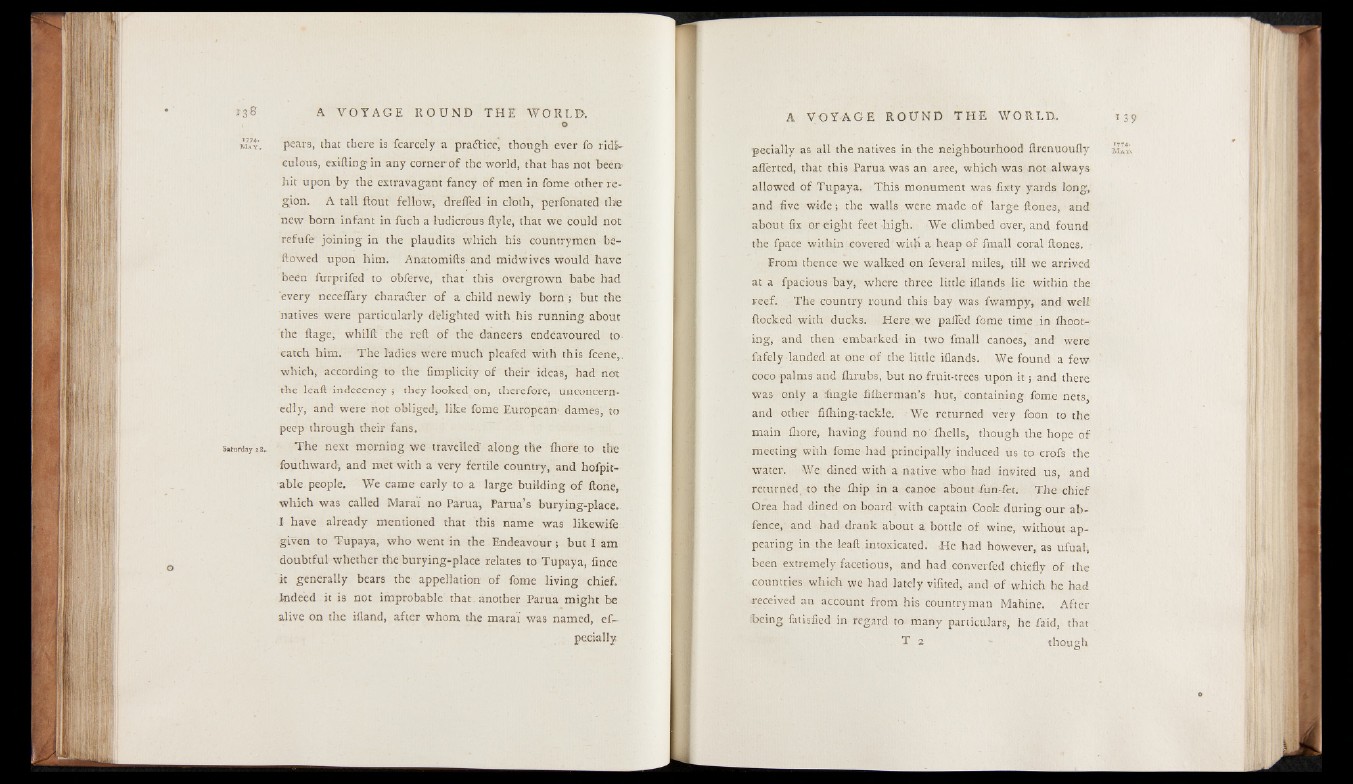
• 138 A V O Y A G E ROUND THE W O E LB ,
o
*uv. pears, that there is fcarcely a practice, though ever fo ridiculous,
exiftingin any cornerof the world, that has not been
hit upon by the extravagant fancy of men in fome other region.
A tall flout fellow, drefled in cloth, perfonated the
new born infant in fitch a ludicrous flyle, that we could not
refufe joining in the plaudits which his countrymen bellowed
upon him. Anatomifts and midwives would have
been furprifed to obferve, that this overgrown babe had
every neceflary character of a child newly born ; but the
natives were particularly delighted with his running about
the ftage, whilft the reft of the dancers endeavoured to
catch him. The ladies were much pleafed with this fcene,,
which, according to the fimplicity of their ideas, had not
the lead indecency ; they looked on, therefore, unconcernedly,
and were not obliged-, like fome European' dames, to
peep through their fans.
s*orday 28- The next morning we travelled' along the fliore to the
fouthward, and met with a very fertile country, and hofpit-
able people. We came early to a large building of ftone,
which was called Marai no Parua-, Farua’s burying-place.
I have already mentioned that this name was likewife
given to Tupaya, who went in the Endeavour; but I am
doubtful whether the burying-place relates to Tupaya, fince
it generally bears the appellation of fome living chief.
Indeed it is not improbable that, another Parua might be
alive on the ifland, after whom the marai was named, efpecklly.
pecially as all the natives in the neighbourhood ftrenuoufly M-Iti
aflerted, that this Parua was an aree, which was not always
allowed of Tupaya. This monument was fixty yards long,
and five wide; the walls were made of large ftones, and
about fix or eight feet high. We climbed over, and found
the fpace within covered witji a heap of fmall coral ftones.
From thence we walked on feveral miles, till we arrived
at a fpacious bay, where three little iflands lie within the
reef. The country round this bay was fwampy, and well
flocked with ducks. Here.we pafied fome time in (hooting,
and then embarked in two fmall canoes, and were
fafely landed at one of the little iflands. We found a few
coco palms and fhr.ubs, but no fruit-trees upon i t ; and there
was only a Angle fifherman’s hut, containing fome nets,
and other fifhing-tackle. We returned very foon to the
main fliore, having found no fhells, though the hope of
meeting with fome had principally induced us to crofs the
water. We dined with a native who had invited us, and
returned, to the fhip in a canoe about fun-fet. The chief
Orea had dined on board with captain Cook during our ab-
fence, and had drank about a bottle of wine, without appearing
in the leaft intoxicated. He had however, as ufual,
been extremely facetious, and had converfed chiefly of the
countries which vve had lately vifited, and of which he had
received an account from his countryman Mahine. After
feeing fatisfied in regard to. many particulars, he faid, that
T 2 - though